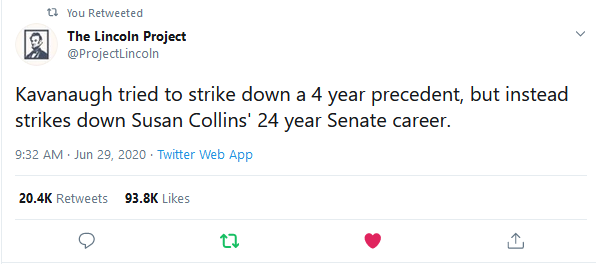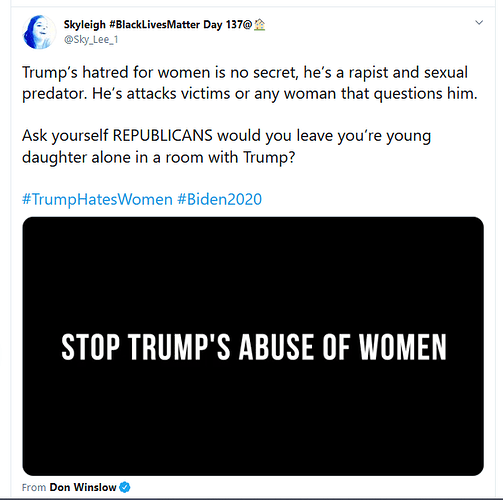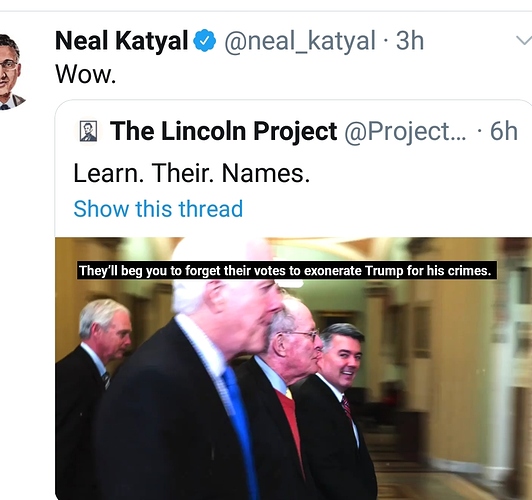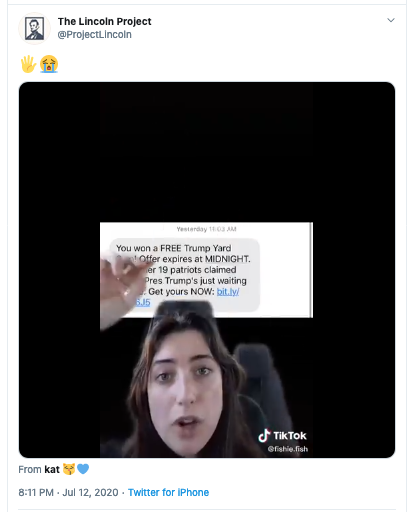

Susan Collins defends her Brett Kavanaugh vote after he dissents in abortion access case
Oh, and:
Bob Woodward talked out of exposing Brett Kavanaugh as anonymous source by Washington Post editor: report
Bob Woodward was prepared to unmask Brett Kavanaugh during his contentious Supreme Court confirmation hearings as an anonymous source for a book the Watergate icon wrote more than 20 years ago but was talked out of it by the Washington Post’s top editor, The New York Times reported on Monday.
Woodward was reportedly set to expose Kavanaugh as an anonymous source for his 1999 book “Shadow: Five Presidents and the Legacy of Watergate.” At the time the book was being written, Kavanaugh served as a lawyer on independent counsel Ken Starr’s team in its investigation of President Clinton.
The revelation would have publicly contradicted what Kavanaugh said in a letter to the Post in 1999, the Times noted.
Woodward’s unmasking of Kavanaugh was set to be published in October 2018, according to the Times, which added that Post executive editor Martin Baron urged Woodward to not burn his source because it would be “bad for Bob” and the newspaper itself if Kavanaugh were exposed.
Woodward’s story never ran as a result.
Kavanaugh, who was accused by several women of sexual misconduct dating back to his high school and college days in the '80s, was confirmed by the Senate after the politically charged hearings in a 50-48 Senate vote primarily along party lines.
Woodward will release a second book about the Trump administration on Sept. 15, just seven weeks before the 2020 presidential election, according to publisher Simon & Schuster. The new book will include interviews with President Trump, who didn’t participate in Woodward’s previous book on the administration, “Fear: Trump in the White House,” released in 2018.
During his Watergate investigative reporting and for decades after, Woodward, along with Carl Bernstein, steadfastly protected his primary source, known only as “Deep Throat.” In 2005, former FBI Deputy Director William Mark Felt publicly confirmed he was the source.
Marty Baron Made The Post Great Again. Now, the News Is Changing.
The ultimate old-school editor is grappling with a moment of cultural reckoning.
Almost anyone who works in the Washington Post newsroom can look inside its publishing system, Methode, to see what stories are coming. And at the height of the furor over Brett Kavanaugh’s nomination to the Supreme Court in 2018, some who did saw a shocking article awaiting publication.
In the article, Bob Woodward, the Post legend who protected the identity of his Watergate source, Deep Throat, for 30 years, was going to unmask one of his own confidential sources. He was, in particular, going to disclose that Judge Kavanaugh had been an anonymous source in his 1999 book “Shadow: Five Presidents and the Legacy of Watergate.”
Mr. Woodward was planning to expose Mr. Kavanaugh because the judge had publicly denied — in a huffy letter in 1999 to The Post — an account about Kenneth Starr’s investigation of President Bill Clinton that he had himself, confidentially, provided to Mr. Woodward for his book. (Mr. Kavanaugh served as a lawyer on Mr. Starr’s team.)
The article, described by two Post journalists who read it, would have been explosive, arriving as the nominee battled a decades-old sexual assault allegation and was fighting to prove his integrity.
The article was nearly ready when the executive editor, Martin Baron, stepped in. Mr. Baron urged Mr. Woodward not to breach his arrangement with Mr. Kavanaugh and to protect his old source’s anonymity, three Post employees said. (The three, as well as other Post journalists who spoke to me, insisted on anonymity because The Post prefers that its employees not talk to the media.)
Mr. Baron and other editors persuaded Mr. Woodward that it would be bad for The Post and “bad for Bob” to disclose a source, one of the journalists told me. The piece never ran.
And the steadfast adherence to the longstanding rules of newspaper journalism and the defense of the institution, which have defined Mr. Baron’s tenure at The Post, prevailed.
Happy newsrooms are all alike but every unhappy newsroom is unhappy in its own way. And in this moment of cultural reckoning, most American newsrooms are unhappy places. They’re reeling from the coronavirus pandemic and under attack from the president of the United States even as they reckon with America’s racial inequalities in their own institutions. At The Post, black staff members’ discontent burst onto Twitter, as a set of high-profile journalists who have left the paper discussed how they felt pushed aside or pushed out. Their complaints, along with previously untold stories recently shared with me, paint a picture of an essential American institution caught in fierce cultural crosscurrents.
The revival of The Post by Mr. Baron and its owner, the Amazon founder, Jeff Bezos, is perhaps the greatest news business success story of the past decade. But that journalistic revival has in some ways masked a messier story, one of many contradictions.
The Post has published some of the best reporting in the 20th century American newspaper tradition that’s ever been done, like the sprawling exposé of America’s war in Afghanistan — all wrapped in a digital marketing, advertising and publishing machine that The Post licenses lucratively to news organizations around the world. It’s a faceless institution in an era of influencers and personal brands. It’s a place where one of the managing editors, Tracy Grant, still hands new reporters a copy of Katharine Graham’s 1997 memoir, though, of course, The Post is no longer owned by the beloved Graham family, but by the world’s richest man. Mr. Baron’s fearless focus on White House coverage and investigations has put it at the center of the American media’s response to President Trump.
But it’s also a top-down institution whose constrained view of what journalism is today has frustrated some of the industry’s creative young stars.
At the heart of The Post’s identity is Mr. Baron, 65, the ultimate old school editor. He rose through the ranks of The Miami Herald and The Los Angeles Times, then arrived at The New York Times in 1996, where he took over the powerful role of night editor, the stern gatekeeper and final approver of any article headed into the print newspaper.
But he frustrated reporters with his punctiliousness, and didn’t play the internal politics of succession. He left The Times in 2000 to take over The Miami Herald, leading its staff to a Pulitzer Prize, and then The Boston Globe, where he published a historic investigation of sexual abuse within the Catholic Church. That showdown became the movie “Spotlight,” in which Liev Schreiber played Mr. Baron as introverted, irascible, and unbending — a depiction that Post employees describe as uncannily accurate.
He arrived at The Post in 2013 “stubbornly retro,” according to a National Journal profile, but when the Amazon founder, Mr. Bezos, bought the paper later that year, Mr. Baron proved the perfect ballast: He wasn’t personally a man of the internet, but he made clear he was all for it. And his journalistic gravitas gave the newsroom comfort during its frantic, overdue shift to the digital age. When other publications seemed unnerved by the election of President Trump, Mr. Baron’s assertion, “We’re not at war with the administration, we’re at work,” seemed to fortify journalists everywhere.
Mr. Baron’s opposition to Mr. Woodward’s story, people who work with him said, wasn’t about favoring Mr. Kavanaugh, or being afraid of a fight. Publishing the article would simply violate the traditional principle that sources should be protected. And it would veer into an uncomfortable and potentially embarrassing new form of journalism, and, in Mr. Baron’s view, imperil the reputation of the institution.
When I asked, repeatedly, for an interview with Mr. Baron, The Post’s spokeswoman, Kris Coratti, instead sent me 4,000 words of excerpts from his many speeches about journalism. The speeches reflected his sophisticated articulation of the importance of open-minded, rigorous and brave journalism. But the speech excerpts didn’t include the credo that stuck with me from a recent memo written by Mr. Baron.
“The Post is more than a collection of individuals who wish to express themselves,” Mr. Baron wrote. “The reputation of The Post must prevail over any one individual’s desire for expression.”
This principle reflects Mr. Baron’s frequently expressed frustration that his reporters’ tweets could undermine The Post’s journalism. It sometimes seems that Mr. Baron is standing athwart Twitter yelling, “Stop!” and nobody’s listening.
The intensity of the debate inside The Post over its journalists’ tweets emerged in an internal survey of reporters’ attitudes, commissioned by the national editor, Steven Ginsberg, without Mr. Baron’s participation. The report, which was circulated in April, described Post management as “ill-equipped to deal with social media in the modern era” and suggested that managers are more forgiving of mistakes “by white men and newsroom stars than they are of women, minorities and less high-profile reporters.”
(The Times, where management has cultivated stars and taken a relatively softer line on Twitter, has its own challenges, and was forced last week to try to purge the vitriol from its internal conversations on Slack. Its chief executive, Mark Thompson, asked employees to avoid “saying insulting and threatening things about co-workers.”)
The Post survey presaged the more intense concerns expressed this month by current and former black journalists about the news industry, in general, and The Post, in particular. Such concerns are not new.
But many Posties (which is how some on the staff refer to themselves) date the current gap between black staff members and leaders of The Post — Mr. Baron and his three managing editors, Cameron Barr, Ms. Grant and Emilio Garcia-Ruiz — to the departure in 2015 of Kevin Merida, then The Post’s managing editor, to lead the ESPN sports and culture site The Undefeated. A handful of black journalists followed him.
The union that represents newsroom employees, The Washington Post Guild, now says it has assembled 32 pages of concerns from current and former employees of color. Black staff members active with the union are pushing for a Twitter campaign to highlight the issues, modeled after a similar recent demonstration at The Los Angeles Times. But such a step would be more provocative at The Post, given the paper’s institutional unease about expressing opinions on Twitter.
Some have already surfaced. Kimbriell Kelly, who left The Post last year for The Los Angeles Times after being passed over for an editing job, tweeted that she was the “only black investigative reporter on WaPo’s Investigative Unit for most of my 7 years there.”
“The notion that only you had to prove yourself as an editor, while sooo many others who didn’t look like you, never did, steamed many of us,” replied Dana Priest, a white veteran national security reporter.
Questions have also arisen within The Post’s video operation, which, like other areas outside Mr. Baron’s core obsessions, has suffered from a lack of clear strategy. Employees said in a meeting this month that personal favoritism had substituted for clear goals, according to detailed notes of the meeting by a participant. One employee said black video editors felt they had to ask permission to get up even to go to the bathroom, when white producers didn’t. Two black editors, who spoke on the condition they not be named, said they’d felt that difference in treatment.
“Staff are always free to take breaks,” Ms. Coratti said. “They are just asked to give others a heads-up that they will be away to ensure that the video hub is not unoccupied in the event of unanticipated news developments.”
A particularly striking issue arose from the coverage of the 2018 killing of a Post columnist, Jamal Khashoggi, by Saudi agents. Karen Attiah, Mr. Khashoggi’s editor, rallied support for him on Twitter, on television and on The Post’s op-ed pages. But when it came time to apply for a Pulitzer Prize — an unscientific process that often serves as an X-ray of newsroom politics and power — Ms. Attiah’s work wasn’t among the 20 pieces submitted. The exclusion, she told me, “stung,” and surprised people who had been following The Post’s work closely.
“I was appalled,” said Mohamed Soltan, a former Egyptian political prisoner and friend of Mr. Khashoggi, who described Ms. Attiah as one of the key journalists on the story.
The Post’s editorial page editor, Fred Hiatt, defended the decision in an email to me: “What you have to leave out in such situations, in this case including excellent work by Jackson Diehl, Karen Attiah and several others, is never easy.”
One thing that is clear is that The Post — which prides itself on providing not just jobs for its staff but long enriching careers — has lost some people any newsroom would want to keep, including Ms. Kelly and Wesley Lowery, who left to become a correspondent for a new “60 Minutes” project on the streaming service Quibi. Another is Soraya Nadia McDonald, who said she had hoped to stretch beyond blogging twice a day on pop culture, which she did at The Post, and wanted “permission and support to be ambitious.” She followed Mr. Merida to The Undefeated, where she was a Pulitzer finalist this year for “essays on theater and film that bring a fresh, delightful intelligence to the intersections of race and art.”
”I don’t think any of that would have been published there,” she said of The Post. “This place just seems to run off its best people.”
The last time Mr. Baron faced sustained complaints from his black staff was in 2016, after Mr. Merida left. Then, a group of black Posties sent Mr. Baron a memo making the case for a new deputy managing editor for diversity. Mr. Baron responded that The Post was relatively diverse compared with other newsrooms and that Ms. Grant had diversity issues in hand. “They represent the bulk of her work and the most rewarding aspects of her job,” Mr. Baron wrote in the memo. “I can’t imagine taking them away from her.”
This time, as The Post rushed to quell the kind of staff uprising that broke out at The New York Times and The Los Angeles Times, that role suddenly held appeal to Mr. Baron. The Post announced on June 18 that it would hire for the role, and an internal email says the deadline for applying is July 3. Mr. Baron would vet applications himself, and he reached out to Shani O. Hilton, my former colleague who is now a deputy managing editor at The Los Angeles Times overseeing its Washington bureau, its national coverage and its foreign desk, suggesting she apply.
“You may have seen the announcement of our new initiatives focused on race, ethnicity and identity,” Mr. Baron wrote to Ms. Hilton.
Ms. Hilton was not interested.
“I have seen over the years that diversity roles, particularly for black women, are the fastest way to be sidelined out of the most important conversations about coverage and hiring,” she wrote back. “The moniker lets other managers think the work of improving representation and newsroom culture doesn’t fall on them.”
Mr. Barr, one of the managing editors, said the job would, in fact, focus on coverage, even if it might not involve directly managing reporters. “This is a job that brings together the journalism and the leadership of the room,” he said.
That new editor will face questions about identity and journalism that extend beyond race. Two Post employees said editors had barred a Post reporter who publicly accused another journalist of sexual assault, Felicia Sonmez, from writing about the subject, citing the appearance of conflict of interest in her public comments. But it’s hard to imagine reporters are expected to be neutral on the issue of sexual assault — and the decision seems almost a caricature of the old idea that only people imagined to have no stake in an issue, often white men, can cover it.
It can, in this fraught moment, be difficult to untangle the forces driving the arguments about newsroom culture, objectivity and fairness. There are, no doubt, real disagreements around the issue of how much journalists’ opinions, identities and experiences should shape coverage and be shared with their audience, and when “objectivity” simply means a dominant point of view.
But one clear strain in the tensions at The Post is simply, and sometimes hilariously, generational. In the happier times of early January 2020, the writer Maura Judkis blew up the internet with the article “People are seeing ‘Cats’ while high out of their minds.” It featured irresistible testimonials from people who described watching the film of the Andrew Lloyd Webber musical while on marijuana, psilocybin mushrooms or other substances, such as: “The most terrifying experience of my life. I swear to God my soul escaped me.”
Mr. Baron, who had not seen the piece before it was published, erupted, two Post employees said, furious that the story was “glorifying recreational drug use,” one of them said.
Ms. Coratti said that Mr. Baron was not “upset” but did “advise that we should be careful not to be seen as celebrating or championing recreational use of drugs.” So the dispute seems to be less about journalistic principle than about whether you like edibles.
Even those who are frustrated by Mr. Baron’s strong-willed style of management speak with reverence of his obsessive commitment to reporting. Still, some of The Post’s challenges will probably be left to his successor. Mr. Baron has told colleagues he will be around through next year’s presidential inauguration, but perhaps not much longer. “Marty will give us a great deal of notice before he retires, and that notice has not been given,” Ms. Coratti said.
But what separates today’s cultural conflicts inside newsrooms from previous generations’ is that they now play out, in real time, in public on social media. And they offer a window into an industry, and society, struggling to find its moral footing around issues of racism.
That seemed a painful takeaway from the recent Post article about a white woman who came as Megyn Kelly-in-blackface to a Halloween party at the home of a Washington Post cartoonist in 2018. The woman lost her job when she told her employer about the coming article, which readers reacted to with outrage and questions about its news value.
“Was this story intended to be a spoof of our culture?” Patrick Gaspard, who served as ambassador to South Africa during the Obama administration and is now the president of the grant-making Open Society Foundations, asked on Twitter. “Did they really invest all this Investigatory resource on this piece to shame this average person who holds no discernible power?”
The story’s handling inside The Post underscores some of the paper’s underlying tensions.
After a guest at the party who believed the woman was a Post employee complained to the paper, editors assigned it to two trusted veterans: Sydney Trent, an experienced former editor, and Marc Fisher, a reporter whom The Post also turned to when someone had to write about Mr. Bezos’s explicit text messages. Mr. Fisher, who is white, reportedly told people he had doubts about the news value of the costume party story, though he led the reporting and writing. Ms. Trent, who is black, saw it as worth doing, three Post journalists said.
White senior editors, including Mr. Baron and Mr. Barr, signed off on the story and sided with Ms. Trent on some questions of tone. That played to old reflexes and new ones: They chose to address a complex moment with the most traditional reportorial form, and they trusted the judgment of a black reporter with a long history of writing and reporting about race. And while many Posties were conspicuously silent about the story on social media, Ms. Trent stood by it, and posted it to her Facebook page to a positive reception.
But black reporters are, of course, not monolithic, and many reporters of all backgrounds at The Post found the 3,000-word investigation puzzling. A random person “dressing like a famous lady in blackface at a party 2 years ago seems the least of our concerns right now,” Ms. Attiah tweeted.










